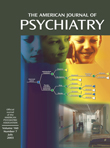Dexamethasone Suppression Test Findings in Subjects With Personality Disorders: Associations With Posttraumatic Stress Disorder and Major Depression
Abstract
OBJECTIVE: Previous studies using the 1.0-mg dexamethasone suppression test (DST) in subjects with personality disorders have produced mixed results. However, these studies focused on major depression and did not consider the possible effects of the comorbidity of posttraumatic stress disorder (PTSD). PTSD has been shown to be associated with increased cortisol suppression. To investigate the effect of PTSD, the authors conducted a 0.5-mg DST, which is more sensitive than the 1.0-mg DST for detection of increased cortisol suppression, in a group of subjects with personality disorders. METHOD: Subjects with personality disorders (N=52) ingested 0.5 mg of dexamethasone. Pre- and postfasting blood samples were drawn for measurement of cortisol levels. A three-way analysis of covariance was used to test for the main effects of major depression, PTSD, and gender on percent cortisol suppression, with plasma dexamethasone concentration as a covariate. Secondary analyses assessed for main and interaction effects of age at which trauma(s) occurred and a diagnosis of borderline personality disorder. RESULTS: Neither major depression nor gender had a significant effect on percent cortisol suppression. Subjects with PTSD had significantly higher percent cortisol suppression than subjects with major depression. Age at which trauma(s) occurred and a borderline personality disorder diagnosis had no significant main or interaction effects on cortisol suppression. CONCLUSIONS: A high level of cortisol suppression was associated with PTSD in subjects with personality disorder. This finding is similar to published findings for PTSD subjects without personality disorders. Major depression, gender, age when trauma(s) occurred, and a diagnosis of borderline personality disorder did not have significant main or interaction effects on cortisol suppression.



